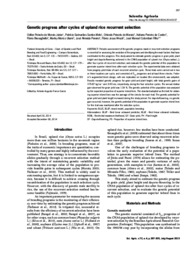Genetic progress after cycles of upland rice recurrent selection.
Genetic progress after cycles of upland rice recurrent selection.
Summary: Periodic assessment of the genetic progress made in recurrent selection programs is essential for assessing the evolution of the programs and identifying the main factors that have contributed to this progress. This study aimed to estimate genetic progress in grain yield, plant height and days-to-flowering achieved in the CNA6 population of upland rice (Oryza sativa L.), after four cycles of recurrent selection; and evaluate the genetic potential of this population to generate superior inbred lines after each selection cycle. The experimental data were obtained from progeny yield trials of each recurrent selection cycle. These trials were carried out in two or three locations per cycle, and consisted of S0:2 progenies and at least three checks. Federer?s augmented block design, with one replication on location (the environment), was adopted. Results revealed genetic progress for grain yield and plant height, with total genetic gains of 375.87 kg ha−1 and -3.90 cm, respectively, during the four selection cycles. The annual relative gain observed for grain yield was 1.54 %. The genetic potential of the population was analysed by the expected proportion of superior inbred lines. The standard adopted as the limit for obtaining superior inbred lines was the average of the checks for each trait. The genetic potential for grain yield and plant height increased during the study period. For days-to-flowering, no genetic gain occurred; however, the genetic potential of the population to generate superior inbred lines for this trait was maintained after the selection cycles.
Publication year: 2015
Types of publication: Journal article
Unit: Embrapa Rice & Beans
Observation
Some of Embrapa's publications are published as ePub files. To read them, use or download one of the following free software options to your computer or mobile device. Android: Google Play Books; IOS: iBooks; Windows and Linux: Calibre.
Access other publications
Access the Agricultural Research Database (BDPA) to consult Embrapa's full library collection and records.
Visit Embrapa Bookstore to purchase books and other publications sold by Embrapa.

